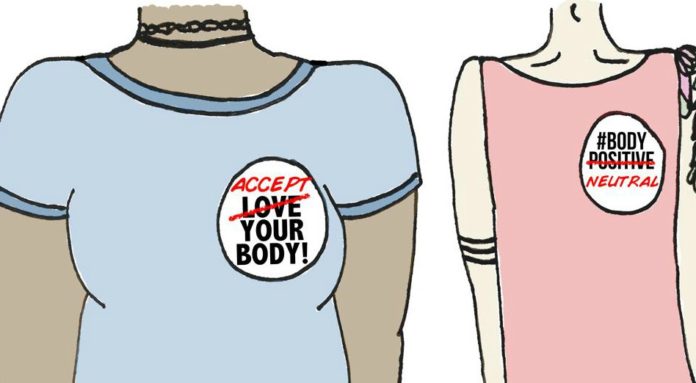Every new year is followed by a flurry of goals aimed at self-improvement. Some individuals make resolutions to stop doing things they don’t want to do, such as cursing or spending too much time on social media. Others intend to keep a daily journal or improve their communication skills in order to improve their emotional health. Many resolutions, on the other hand, are centred on physical well-being: get more sleep, drink more water, eat more fruits and vegetables, and schedule time for exercise. Even if you make a real attempt to love your body, any of these factors might prevent you from doing so. “You do not always adore your body, but you may still live happy and healthy,” says body neutrality. ALSO READ : PROMOTING BODY IMAGE IN CHILDREN.
Many individuals glance in the mirror and are unsatisfied with what they see, so they resolve to make adjustments so that they may better embrace self-love. The image you see in the mirror is only one facet of your personality. Even if you don’t love your physique, you can embrace and accept yourself just the way you are. In reality, your body isn’t required to participate in the discourse. This is the foundation of the body neutrality movement.
All of the critical organs that keep you alive and working are housed in your body. It also houses your mind, heart, and soul, which are the elements that shape your personality and self-identity and help you become the person you are. Body neutrality encourages you to accept your body as it is, focusing on its talents and nonphysical features rather than its appearance.
This movement tries to decentralise the body as an object by debunking the misconception that your value is determined by how you appear. It also allows you to take a step back from body language in general. There’s nothing wrong with appreciating your physical appearance. Many individuals do, even if they feel themselves to be flawed or unattractive. Others may despise their bodies so much that they focus all of their efforts on improving their looks and fail to feel at ease or enjoy everyday life.
Bodies have a variety of distinct properties. Your body’s appearance might be influenced by your life experiences. Your look may be influenced by a skin or health problem. Perhaps you’ve had an illness or injury that has permanently altered your physique or reduced your mobility. Maybe you just wish you had other characteristics.
WHAT MAKES BODY NEUTRALITY DIFFERENT FROM BODY POSITIVITY
The body positivity movement urges you to love and accept your body, regardless of its appearance. Body positivity promotes the notion that everyone is attractive. On the other hand, body neutrality simply declares that everyone is. After all, you’re more than simply your physique. Beauty isn’t the only quality worth appreciating. Body neutrality is seen as a more realistic viewpoint by many.
This movement recognises that you may not love your body every day, and that this is perfectly acceptable. Even if you don’t love your body, you may accept it as it is. Body neutrality aids in the recognition and prioritisation of how you are feeling in your body. This might include exercising your body just because it feels good and you like it, rather than to “burn off” the food you’ve consumed. It also implies that you pay attention to your body to choose when to stop or take a break. Wearing clothing that feels comfortable on your body is another benefit of practising body neutrality. You may be thankful that you have a strong, healthy body that allows you to do the things you want to do.
Body neutrality does not imply that you should make harmful decisions. It entails paying attention to your body and allowing it to lead you. Mindfulness is a crucial component of this.
What’s the psychology behind it?
Body neutrality is a concept that challenges the notion that you must love your body and appearance in order to feel good about yourself. You don’t have to despise or adore your physique in reality. Instead, embrace it for what it is: a vehicle that transports you from point A to point B while allowing you to experience everything that life has to offer. Not everyone adores their body all of the time, or even all of the time. Body positivity movements frequently encourage you to practise self-love affirmations, such as “I am beautiful,” “I love myself,” or “I adore my body,” until they become true.
For some individuals, these mantras are effective. However, confirming yourself when you don’t believe the claims you’re saying might make you feel even worse. You can’t force yourself to discover love that isn’t there. Telling yourself that you should love your body is a trap that will only add to your misery by making you feel as if you’ve failed. Body neutrality is beneficial to everyone, but it is especially appealing to those who find appreciating their bodies difficult.
Body neutrality urges you to see beyond your physical looks and break the tendency of relating your self-worth to your body. Instead of criticising defects others have brought out or fretting about how other people see you, it allows you to embrace your body’s unique qualities and cherish it for what it accomplishes.
What is the best way to begin practising body neutrality?
Have you ever become weary of thinking about or talking about your body? These suggestions might assist you in being more body neutral.
Exclude body language from your talks.
This includes self-talk in the form of body language. Instead of berating yourself if your jeans are too tight, you may just buy a pair of trousers that are comfortable and easy to move around in.
Change the subject of the conversation
If friends or family members bring up weight, size, or body dissatisfaction, focus on how you (or they) feel rather than how you look.
Consume the meals that you desire.
Choose complete, fresh meals that are good for your health, but don’t be afraid to indulge in sweets and snacks if you’re desiring something sweet.
Pay attention to your body.
Choose enjoyable physical activities rather than those that seem like punishment. Don’t punish yourself for taking it easy when you’re weary and exhausted.
Recognize and reframe ideas about your body that you don’t like.
Consider what your body is doing for you right now if you catch yourself criticising it. Concentrate on its resilience and capacity to heal, move, and adapt.
Give it some time.
Shifting from a habit of pessimism, or false optimism, to a more neutral middlepoint takes time.
As you accept neutrality, try to be patient. Media and advertising can drive you in the other direction, making it an uphill struggle.




